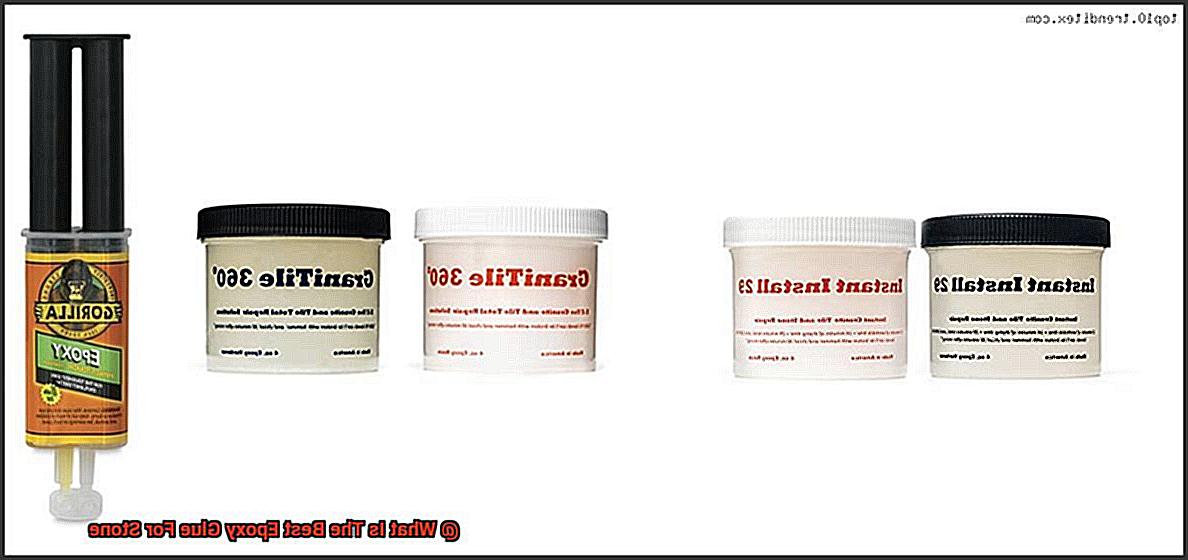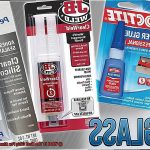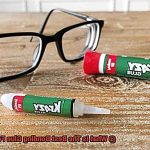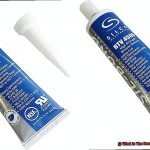Are you tired of searching high and low for the perfect epoxy glue to fix your precious stone treasures?
Well, fret no more. This blog post is here to save the day.
Contents
- 1 Benefits of Using Epoxy Glue for Stone
- 2 Factors to Consider When Choosing an Epoxy Glue for Stone
- 3 Bond Strength and Curing Time
- 4 Color Options
- 5 Types of Epoxy Glues Specifically Designed for Bonding Stone
- 6 Tips on How to Apply the Best Epoxy Glue for Stone
- 7 Troubleshooting Common Issues with Applying Epoxy Glue
- 8 Professional Recommendations and Customer Reviews
- 9 Conclusion
We’re about to spill all the beans on the best epoxy glue for stone, so you can make an informed decision without breaking a sweat. Whether you need to mend cracks in a stunning stone sculpture or patch up a broken countertop, we’ve got your back.
So get ready to dive deep into the world of epoxy glues and find that magical potion that’ll bring your beloved stone items back to life.
Benefits of Using Epoxy Glue for Stone
Choosing the right adhesive for bonding stone materials is crucial, and epoxy glue is a standout option. Its exceptional strength and durability make it an ideal choice for various stone projects. In this article, we will explore the benefits of using epoxy glue for stone, including its strong bonding power, ability to fill gaps and cracks, water resistance, high strength, chemical resistance, longer working time, versatile formulation, and enhanced appearance.
Strong Bonding Power:
Epoxy glue is renowned for its strong bond, ensuring a secure connection between stone surfaces. It provides a long-lasting hold, making it suitable for bonding different types of stones.
Filling Gaps and Cracks:
Stone surfaces often have natural imperfections like gaps and cracks. Epoxy glue effectively fills in these voids, resulting in a seamless and aesthetically pleasing finish. Say goodbye to unsightly gaps and hello to a flawless surface.
Water Resistance:
Water resistance is crucial to prevent damage to stone projects. Epoxy glue forms a waterproof barrier, protecting the stone from moisture-related issues and maintaining its integrity over time.
High Strength:
Epoxy adhesives boast excellent tensile strength, enabling them to withstand heavy loads and vibrations without compromising the bond. This feature makes epoxy glue particularly useful for bonding large or heavy stone pieces that require extra support.
Chemical Resistance:
Certain types of stones may come into contact with chemicals or solvents during their lifespan. Epoxy glue’s outstanding chemical resistance ensures that no harmful reactions occur, protecting the bond between stones and preserving their structural integrity.
Longer Working Time:
Epoxy glue offers a relatively longer working time compared to other adhesives. This feature allows users to position and adjust the stones before the adhesive sets, especially beneficial for intricate or complex stone projects that demand precision.
Versatile Formulation:
Epoxy glue comes in various formulations, including different viscosities and curing times. This versatility allows users to choose the most suitable type for their specific project needs. Whether bonding delicate stones or working on heavy-duty applications, there’s an epoxy glue formulation for every stone project.
Enhanced Appearance:
In addition to its adhesive properties, epoxy glue can also enhance the visual appeal of stone surfaces. It can be tinted or colored to match the color of the stones, creating a seamless and cohesive look that blends flawlessly with the surrounding environment.
Factors to Consider When Choosing an Epoxy Glue for Stone
When it comes to bonding stone, selecting the right epoxy glue is crucial for achieving a strong and durable bond. With numerous options available, it can be overwhelming to make a decision. In this article, we will explore the key factors to consider when choosing an epoxy glue for stone to ensure the success of your project.
Factor 1: Bond Strength
Stone is heavy and durable, necessitating an epoxy glue with high bond strength. Look for epoxy glues specifically formulated for stone bonding, as they tend to offer superior bond strengths compared to general-purpose glues.
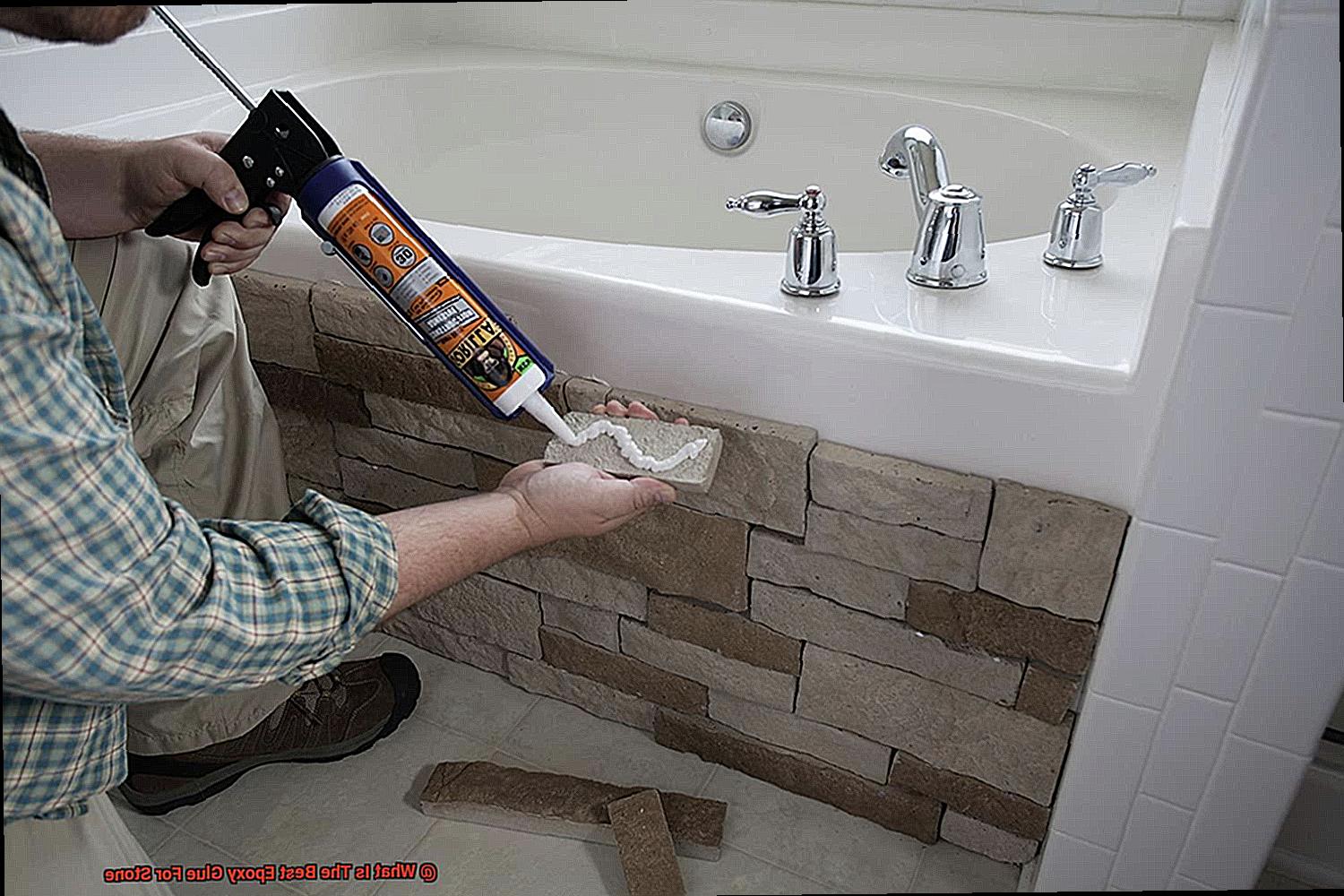
Factor 2: Curing Time
Consider the curing time of the epoxy glue. If time is of the essence, opt for a glue with a shorter curing time. However, if you prioritize a stronger bond and have more time to spare, choose an epoxy glue with a longer curing time.
Factor 3: Temperature Resistance
Stone surfaces are often exposed to temperature fluctuations. Ensure that the epoxy glue you choose can withstand both high and low temperatures without losing its adhesive properties. This will guarantee that your stone bond remains intact, even in extreme weather conditions.
Factor 4: Waterproofness
If your stone project will be exposed to water or moisture, such as in a bathroom or outdoor setting, select an epoxy glue with excellent waterproof properties. This will prevent water damage or weakening of the bond over time.
Factor 5: Color Matching
For aesthetic purposes, especially when working with colored stones, consider the color matching capability of the epoxy glue. Look for glues that come in various colors or can be tinted to match the stone’s color, ensuring a seamless and inconspicuous bond.
Factor 6: Ease of Use
Choose an epoxy glue that suits your level of experience and comfort with adhesive applications. Consider factors such as viscosity and applicator options to ensure easy and precise application. A user-friendly epoxy glue will contribute to a smoother and more efficient bonding process.
Factor 7: Safety Precautions
Always prioritize safety. Read the product labels and instructions carefully to understand any necessary safety measures. Choose an epoxy glue that is safe to use and does not release harmful fumes or toxins during the curing process. This will protect you and the environment while working on your stone project.
Bond Strength and Curing Time
In this article, we will delve into the two critical factors to consider when selecting the best epoxy glue for stone: bond strength and curing time.
Bond strength is akin to the foundation of a relationship – it holds everything together. When it comes to epoxy glues, you need a robust bond that can endure stress and movement. Picture bonding two pieces of stone only to have them separate at the slightest touch. Heartbreaking, right? So, it is imperative to choose an epoxy glue with high bond strength.
However, bond strength is not solely reliant on the glue itself. Surface preparation and application technique also play a significant role. Before applying the epoxy glue, make sure to clean and prepare the stone surfaces meticulously. This guarantees a stronger bond and prevents any dirt or debris from interfering with the adhesive.
Now let’s explore curing time. Curing time is akin to waiting for a relationship to blossom. It refers to the duration it takes for the epoxy adhesive to fully harden and reach its maximum strength. Different epoxy glues boast varying curing times. Some offer quick cures, allowing you to complete your project in a jiffy. Others take longer but provide a stronger bond.
When selecting an epoxy glue, take into account your project requirements and timeline. If you are working on a time-sensitive project, opt for a glue with a shorter curing time. However, if you have more time and prioritize a stronger bond, choose one with a longer curing time.
Nevertheless, do not forget that some epoxy glues strike the perfect balance between bond strength and curing time. These glues cure within a reasonable timeframe while still offering sufficient bond strength for most stone applications.
Color Options
When it comes to stone projects, choosing the right adhesive can make all the difference. And let me tell you, my friend, color options can take your epoxy glue game to a whole new level. Whether you want to showcase the natural beauty of the stone or add a splash of color for a unique touch, there’s a wide range of options to choose from.
Let’s start with clear epoxy glue. This transparent adhesive is like magic – it creates an invisible bond that allows the true colors of the stone to take center stage. It’s perfect for those translucent or light-colored stones that you just don’t want to hide. With clear epoxy, your project will look seamless and effortlessly beautiful.
But maybe you’re feeling a bit more adventurous and want to inject some personality into your stone project. Well, my friend, colored epoxy glues are here to save the day. You can find them in all sorts of shades – black, white, gray, and even metallic colors like gold or silver. These colored options give you the opportunity to create striking contrasts or harmonious blends with your stone.
When selecting a colored epoxy glue, think about the overall design and desired outcome of your project. If you’re working with a dark-colored stone, using a black or dark gray epoxy can create a seamless look that blends right in. On the other hand, if you want to make a statement, go for a contrasting color like white or light gray. Trust me, it will catch everyone’s eye.
But hold on, there’s more to consider. If your stone project will be exposed to direct sunlight, it’s important to choose an epoxy glue that can withstand UV damage. You don’t want your adhesive color fading or turning yellow over time. Look for specially formulated options that offer UV resistance, keeping your project looking fresh and vibrant for years to come.
Types of Epoxy Glues Specifically Designed for Bonding Stone
When it comes to bonding stone, you need a glue that can withstand the test of time. Enter epoxy glues – specially designed to provide the necessary strength and durability for securely attaching stones, whether it’s granite, marble, or natural stones. In this article, we’ll explore the various types of epoxy glues available for bonding stone and discover their unique properties, so you can choose the best one for your project.
Two-Part Epoxy Adhesive – Unbreakable Bonds:
For unbreakable bonds between stones, look no further than two-part epoxy adhesive. This glue consists of two components – a resin and a hardener. When combined, they undergo a chemical reaction, resulting in a bond that is strong and resilient. With exceptional strength and resistance to environmental conditions, two-part epoxy adhesive is perfect for bonding stone materials.
Structural Epoxy Adhesive – Built to Last:
When heavy-duty bonding of stone materials is required, structural epoxy adhesive is the go-to glue. Formulated for exceptional strength and durability, it excels in construction and architectural applications. Withstanding heavy loads and providing long-lasting bonds, structural epoxy adhesive ensures your stone remains securely attached over time.
Stone-Specific Epoxy Glues – Tailored for Perfection:
Not all stones are created equal, which is why specific epoxy glues are designed for different types of stone. Granite, marble, limestone, or sandstone – there’s an epoxy glue formulated to enhance compatibility with each stone’s unique properties. These glues contain additives or modifiers that ensure a perfect bond and lasting results.
Fast-Curing Epoxy Glue – Time is Money:
When time is of the essence, fast-curing epoxy glues come to the rescue. Offering quick curing times, these glues allow you to complete your project in no time. Whether you’re on a tight deadline or working with time-sensitive materials, fast-curing epoxy glues are the way to go.
Flexible Epoxy Glue – A Little Give and Take:
Stone may experience slight movements or expansions over time, which can compromise the bond. Flexible epoxy glues save the day by accommodating these slight movements without breaking the bond. With a little give and take, they ensure a secure and long-lasting bond, especially when working with stones prone to movement.
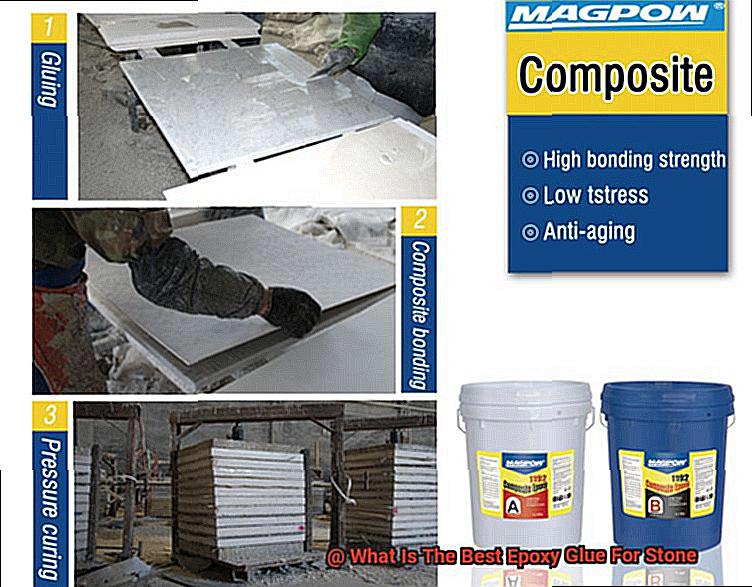
Tips on How to Apply the Best Epoxy Glue for Stone
Epoxy glue is an excellent choice for bonding stone because it is super strong and durable. In this comprehensive guide, we will explore some useful tips that will help you apply the best epoxy glue for stone like a pro.
Prepare the Surface:
Before applying epoxy glue, it’s crucial to prepare the surface of the stone properly. Imagine a clean canvas ready for a masterpiece. Begin by cleaning the stone thoroughly using soap and water to remove any dirt, dust, or grease. Allow the surface to dry completely, ensuring a strong bond.
Choose the Right Epoxy Glue:
Just like selecting the perfect tool for the job, choose epoxy glues specifically designed for bonding stone. These glues are specially formulated to withstand the weight and stress placed on the stone, creating a bond that lasts.
Read Instructions Carefully:
Every epoxy glue has its own set of instructions for application. Think of it as a recipe for success. Take your time to read and understand the mixing ratios and curing times specified by the manufacturer. Following these instructions will ensure a successful bond.
Mix It Up:
Mixing epoxy glue is like creating a harmonious blend of flavors in cooking. Mix the epoxy glue according to the manufacturer’s instructions, usually in two parts – resin and hardener. Use a clean container and stir them together in the correct proportions until you achieve a smooth, homogeneous mixture.
Apply Evenly:
Applying epoxy glue is like spreading frosting on a cake – even distribution is key. Use a small brush or spatula to apply a thin layer of epoxy glue onto both surfaces that need bonding. Ensure that you cover the entire area evenly, like a painter meticulously covering every inch of their canvas.
Press and Hold:
Just like a firm handshake, pressing and holding the surfaces together is vital for a strong bond. After applying the glue, firmly press the surfaces together and hold them in place for the recommended curing time. This pressure helps create a bond that can withstand the test of time.
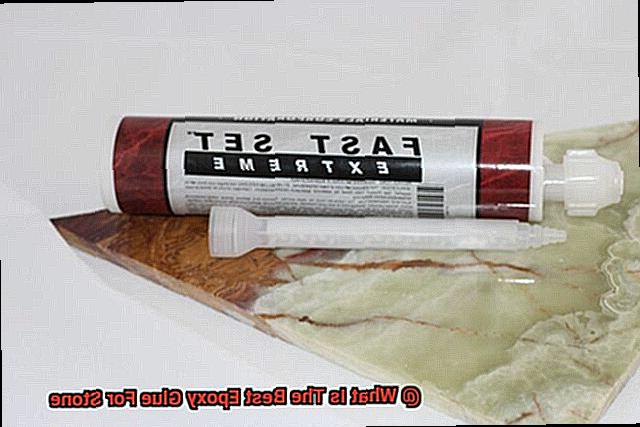
Troubleshooting Common Issues with Applying Epoxy Glue
Bonding stone with epoxy glue requires skill and attention to detail. Just like any artistic endeavor, challenges can arise. In this section, we will explore common issues that can occur when applying epoxy glue to stone and provide troubleshooting tips to overcome them. So, put on your apron and let’s dive in.
Surface Preparation: The Canvas for Success
To achieve optimal results, the stone surface must be clean and free from dirt, dust, or debris. Think of it as painting on a dirty canvas – the outcome won’t be ideal. Use a mild detergent or specialized stone cleaner and rinse thoroughly before applying the epoxy. A clean surface ensures proper adhesion and a strong bond.
Mixing: A Symphony of Components
Just like mixing colors on a palette, proper mixing of epoxy components is crucial for a strong bond. Follow the manufacturer’s instructions carefully, using a clean mixing container and tool. Pay close attention to the ratio of resin and hardener for optimal adhesive properties. Think of it as conducting a symphony – each component must harmonize perfectly.
Temperature and Humidity: The Dance of Environment and Bonding
Environmental conditions can impact the curing process and bonding strength. Check the manufacturer’s guidelines regarding temperature and humidity requirements. In extreme conditions, you may need to create controlled conditions using heat lamps or dehumidifiers. Think of it as choreographing a dance – the perfect balance ensures a flawless performance.
Clamping or Pressure Application: Maximizing Contact
Clamps are your artist’s palette knife – they ensure maximum contact between surfaces and eliminate air gaps or voids that weaken the bond. Apply sufficient pressure during the curing process using clamps, weights, or other recommended methods. Think of it as molding clay – shaping it with precision creates a masterpiece.
Knowing Your Limits: Choosing the Right Stone
Even skilled artists know their limitations. Not all types of stone are suitable for bonding with epoxy due to porosity, texture, or chemical composition. Consult a specialist or the epoxy glue manufacturer to determine if it is appropriate for your specific stone. Think of it as selecting the right brush – using the right tool ensures a masterpiece every time.
Professional Recommendations and Customer Reviews
Selecting the perfect epoxy glue for stone is no small task. Luckily, professional recommendations and customer reviews are here to help. These two sources of information are crucial in making an informed decision that will ensure the success of your project.
Professional recommendations are like getting advice straight from the experts themselves. These individuals have years of experience working with different types of epoxy glues for stone and their expertise can guide you towards the best options available in terms of quality, performance, and durability. You can find professional recommendations in industry publications, online forums, and websites dedicated to stone crafting or construction.
These sources often feature product reviews, comparisons, and recommendations from professionals who have tested various epoxy glues for stone. By reading about their experiences and preferences, you can gain a better understanding of which brands or types of epoxy glues are highly regarded by experts in the field.
But what about the experiences of everyday customers like yourself? This is where customer reviews come into play. Customer reviews offer real-world insights into the performance of epoxy glues for stone. They provide information on factors like ease of use, bonding strength, drying time, and overall satisfaction with the results.
While individual experiences may vary, reading a variety of customer reviews from different sources can give you a general sense of the pros and cons of various epoxy glues for stone.
Popular online retailers often feature customer reviews alongside product listings, providing valuable information about the experiences of other customers who have purchased and used specific epoxy glues.
Additionally, forums or social media groups dedicated to stone crafting or construction projects can be a goldmine for customer reviews. Engaging with these communities allows you to ask questions, seek recommendations, and gather insights from fellow enthusiasts or professionals who have firsthand experience with epoxy glues for stone.
YMDZKL-hqeI” >
Also Read: What Is the Best Epoxy Glue?
Conclusion
In conclusion, when it comes to finding the best epoxy glue for stone, there are a few top contenders that stand out.
One of these is the E6000 Craft Adhesive. With its strong bond and versatility, it is a reliable choice for various stone projects.
Another excellent option is the PC Products PC-7 Epoxy Paste. This heavy-duty adhesive can withstand extreme conditions and provides a durable bond for stones of all types.
Lastly, the Loctite Epoxy Five-Minute Instant Mix offers convenience and quick setting time, making it perfect for small stone repairs or touch-ups. Ultimately, the best epoxy glue for stone will depend on your specific needs and preferences.
However, with these options in mind, you can confidently tackle any stone project with ease and precision.

